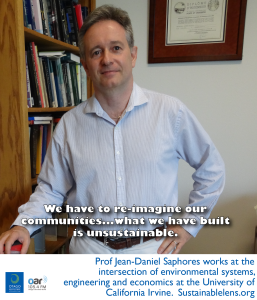We have to re-imagine our communities…what we have built is unsustainable
Working at the crossroads of environmental systems, civil engineering, transport economics, resource economics and sustainability, Jean-Daniel Saphores is holds multiple roles at University of California Irvine. He is: Professor, Civil & Environmental Engineering in the The Henry Samueli School of Engineering; Professor of Economics in the School of Social Sciences; and Professor of Planning, Policy and Design in The School of Social Ecology.
Talking points
I was always concerned with the environment, and the impact of the environment on our health…I thought we could do better at how we relate to the environment.
Building structures to take advantage of what nature has to offer to fulfil our needs
Uncertainty could come in many forms, it could be uncertainty in natural processes, uncertainty in prices…in the real world we face a lot of
Uncertainty, but in economics most models are deterministic – that assume we know everything, of course this has limitations, because, as you know, we don’t know everything.
Assuming we know everything may not be the best way to go
Using a deterministic framework can be the wrong thing to do
So many things we don’t know
Doing nothing is not the solution if we’re facing dire problems
(can values be represented in economic models?) They can be captured to some extent.
For your work to be useful, you want to try to apply models.
My main interest is the the link between transportation systems and environmental systems: so environment, transportation and health.
Many facets of the transportation system are important to welfare
More than just efficiency of transport, the idea is to try to change urban form
We have to reimagine our communities…what we have built is unsustainable
I like electric cars, but we still need to rethink our urban form
Shared services could really improve our situation
We get the society we deserve but it is important we understand the implications of our choices
(Are people generally good?) Values and norms drive peoples behaviour…norms are more important than incentives
Children good way to bring message home…school benefits programmes
Reluctance in the US to rely on economic instruments
Recycling isn’t a herculean task, it just requires you to be consistent…and once you have a habit you are set
Recycling…but these are just marginally changes, if we really want to make a bigger impact, we need to revisit our way of living
It’s pretty clear not everyone can enjoy the lifestyle we have in US…but even here it’s entirely unsatisfactory to have 15% poverty rate including one out of five children, if we look at that we should be very unsatisfied with our current economic system if we have any kind of
ethical values.
We need to have convergence – economic development in poor parts of the world, the type of economic development that avoids environmental degradation that was generated the way the US, Europe and Japan developed, then in our part of the world we need to really take into account the impacts of our decisions to consume. I believe that most people would take steps to change their lifestyle, and we also need to take a look at how we organise our lives on a daily basis in our cities and so on, change our codes so that over the next two decades we can have convergence. We can not deny reasonable affluence to other parts of the world…in any case if we carry on the current path we may be in for trouble.
We can do better to separate growth and resource consumption. I’m an optimist, I believe it is possible to decrease poverty and enhance
people’s lives without completely ruining the planet.
I do believe in economic instruments, so trade is important, better trade, trade that takes into account the environmental impact
I believe that over time convergence will happen…otherwise we’re in trouble
(Success) Adopting my son
(Activist) Not yet. I’m a member of the Union of Concerned Scientists, but I’ve only been moderately concerned so far. I’m going to become more concerned and more active. Poverty and environmental quality – together.
(Motivation) Future of planet and our legacy to our children.
(Challenges) Upgrade academic skills and do good.
(Miracle) We face the challenges
(Advice) Do good and enjoy yourselves
This Sustainable Lens is from a series of conversations at University California Irvine in June 2015. Sam’s visit was supported by the Newkirk Center for Science and Society, and coincided with Limits 2015.

